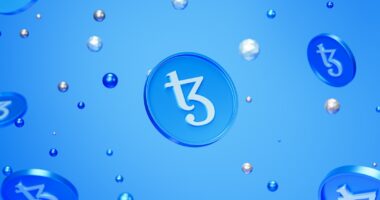Non-fungible tokens, or NFTs, have emerged as a revolutionary force within the digital economy, fundamentally altering how we perceive ownership and value in the virtual realm. Unlike cryptocurrencies such as Bitcoin or Ethereum, which are fungible and can be exchanged on a one-to-one basis, NFTs are unique digital assets that represent ownership of a specific item or piece of content, often linked to art, music, videos, and even virtual real estate. This uniqueness is secured through blockchain technology, which ensures that each NFT is distinct and cannot be replicated.
The rise of NFTs has not only created new avenues for artists and creators to monetize their work but has also sparked a broader conversation about the nature of ownership in an increasingly digital world. As more individuals and businesses recognize the potential of NFTs, they are beginning to reshape traditional economic models, leading to a burgeoning market that is both exciting and complex. The impact of NFTs on the digital economy extends beyond mere financial transactions; it also influences cultural dynamics and societal norms.
For instance, the ability to buy, sell, and trade digital art has empowered artists to reach global audiences without the constraints of traditional galleries or auction houses. This democratization of access has led to a surge in creativity and innovation, as artists experiment with new forms of expression that were previously unimaginable. Moreover, NFTs have introduced concepts such as provenance and scarcity to the digital landscape, allowing collectors to invest in digital assets with a sense of authenticity and value.
As the NFT market continues to evolve, it raises important questions about intellectual property rights, environmental sustainability due to energy-intensive blockchain processes, and the long-term viability of digital ownership. The ongoing dialogue surrounding these issues will undoubtedly shape the future trajectory of both NFTs and the broader digital economy.
Key Takeaways
- NFTs are revolutionizing the digital economy by providing a unique way to buy, sell, and trade digital assets.
- Building a strong foundation in blockchain technology is essential for understanding the underlying technology behind NFTs.
- Navigating the legal and regulatory landscape of NFTs is crucial to ensure compliance and protect intellectual property rights.
- Developing skills in digital art and collectibles is key to creating and selling NFTs in the marketplace.
- Exploring opportunities in NFT marketplaces and platforms can help individuals and businesses capitalize on the growing NFT trend.
Building a Strong Foundation in Blockchain Technology
Understanding the Backbone of NFTs: Blockchain Technology
To fully grasp the significance of NFTs, one must first develop a solid understanding of blockchain technology, the backbone that supports these unique digital assets. At its core, blockchain is a decentralized ledger system that records transactions across multiple computers in a way that ensures security and transparency. This technology eliminates the need for intermediaries, such as banks or payment processors, thereby reducing costs and increasing efficiency.
Delving Deeper into Blockchain and NFTs
By understanding how blockchain operates, individuals can appreciate the mechanisms that underpin NFTs and their potential applications across various industries. Furthermore, grasping concepts such as smart contracts—self-executing contracts with the terms of the agreement directly written into code—can provide deeper insights into how NFTs function and how they can be utilized for various purposes beyond mere collectibles. Building a strong foundation in blockchain technology also involves familiarizing oneself with different blockchain platforms that support NFTs.
Exploring Blockchain Platforms and Wallet Systems
Ethereum is currently the most widely used platform for creating and trading NFTs due to its robust smart contract capabilities; however, other blockchains like Binance Smart Chain, Flow, and Tezos are gaining traction as alternatives that offer unique features and benefits. Understanding the nuances of these platforms can empower creators and investors to make informed decisions about where to mint or purchase their NFTs. Additionally, knowledge of wallet systems for storing cryptocurrencies and NFTs is crucial for anyone looking to engage in this space.
Positioning Yourself in the NFT Landscape
By investing time in learning about blockchain technology, individuals can position themselves at the forefront of this rapidly evolving landscape, equipped with the skills necessary to navigate its complexities.
Navigating the Legal and Regulatory Landscape of NFTs

As the NFT market continues to expand, navigating the legal and regulatory landscape becomes increasingly critical for creators, collectors, and investors alike. The legal status of NFTs remains somewhat ambiguous in many jurisdictions, leading to a patchwork of regulations that can vary significantly from one region to another. Issues such as copyright infringement, intellectual property rights, and consumer protection are at the forefront of discussions surrounding NFTs.
For instance, when an artist mints an NFT representing their work, questions arise regarding who holds the copyright: the artist or the buyer? Understanding these legal intricacies is essential for anyone looking to engage in the NFT space responsibly and ethically. Moreover, regulatory bodies around the world are beginning to take notice of the NFT phenomenon, prompting discussions about potential frameworks for oversight.
In some countries, NFTs may be classified as securities or commodities, subjecting them to specific regulations that govern trading practices and disclosures. This evolving regulatory environment necessitates that individuals stay informed about changes in legislation that could impact their activities within the NFT market. Engaging with legal experts who specialize in digital assets can provide valuable guidance on compliance issues and help mitigate risks associated with potential legal disputes.
As the NFT landscape matures, those who proactively navigate these legal challenges will be better positioned to thrive in an increasingly complex environment.
Developing Skills in Digital Art and Collectibles
For artists and creators looking to enter the NFT space, developing skills in digital art and collectibles is paramount. The digital art landscape is vast and varied, encompassing everything from traditional painting techniques adapted for digital mediums to innovative forms like generative art and interactive installations. Artists must familiarize themselves with various software tools such as Adobe Creative Suite, Procreate, or Blender to create high-quality digital works that resonate with audiences.
Additionally, understanding design principles such as composition, color theory, and visual storytelling can significantly enhance an artist’s ability to produce compelling pieces that stand out in a crowded marketplace. Beyond technical skills, artists should also cultivate an understanding of what makes a collectible desirable within the NFT ecosystem. Factors such as rarity, utility, and community engagement play crucial roles in determining an NFT’s value.
Artists can benefit from studying successful NFT projects to identify trends and strategies that resonate with collectors. Furthermore, engaging with online communities dedicated to digital art can provide valuable feedback and foster collaboration opportunities. By honing their craft and understanding market dynamics, artists can position themselves for success in an ever-evolving landscape where creativity meets technology.
Exploring Opportunities in NFT Marketplaces and Platforms
The proliferation of NFT marketplaces has created a wealth of opportunities for creators and collectors alike. Platforms such as OpenSea, Rarible, Foundation, and SuperRare have emerged as popular venues for buying and selling NFTs, each offering unique features tailored to different audiences. For creators, these marketplaces provide an accessible entry point into the world of NFTs without requiring extensive technical knowledge or resources.
By listing their work on these platforms, artists can reach a global audience of potential buyers while retaining control over their intellectual property rights through smart contracts. For collectors and investors, exploring various NFT marketplaces allows for diversification within their portfolios. Each platform may cater to different niches—some focusing on high-end art while others emphasize gaming assets or virtual real estate—enabling collectors to find specific types of NFTs that align with their interests.
Additionally, many marketplaces offer social features that facilitate community engagement through comments, likes, and sharing options. This sense of community can enhance the overall experience of collecting NFTs while providing valuable insights into emerging trends within the space. As new marketplaces continue to emerge and existing ones evolve, staying informed about these platforms will be essential for anyone looking to capitalize on opportunities within the NFT ecosystem.
Networking and Building Relationships in the NFT Community

Building Connections in the NFT Community
Networking within the NFT community is crucial for anyone seeking to establish themselves in this dynamic space. The community is diverse and includes artists, collectors, developers, investors, and enthusiasts who share a common interest in digital assets. Engaging with this community can lead to valuable connections that foster collaboration opportunities and provide insights into market trends.
Online Platforms for NFT Networking
Social media platforms like Twitter and Discord have become popular hubs for NFT discussions where individuals can share their work, seek feedback, or participate in conversations about industry developments. By actively participating in these online spaces, individuals can build relationships that may lead to partnerships or mentorship opportunities.
Expanding Your Network Through Events
In addition to online networking, attending virtual or physical events such as conferences, exhibitions, or meetups can further enhance one’s presence within the NFT community. These gatherings often feature panels with industry leaders discussing current trends or workshops aimed at skill development. Engaging face-to-face (or screen-to-screen) with fellow enthusiasts allows for deeper connections that can transcend mere transactional relationships.
Unlocking Opportunities Through Trust and Collaboration
As trust builds within these networks, individuals may find themselves receiving invitations to collaborate on projects or participate in exclusive drops—opportunities that can significantly elevate their standing within the NFT ecosystem.
Staying Updated on Trends and Innovations in the NFT Space
The NFT landscape is characterized by rapid change and innovation; thus, staying updated on trends is essential for anyone involved in this space. New technologies are continually emerging that enhance how NFTs are created, traded, or utilized across various sectors—from gaming to music to virtual reality experiences. Subscribing to industry newsletters or following thought leaders on social media can provide timely insights into developments that may impact one’s strategies or investments.
Additionally, engaging with educational resources such as webinars or online courses can deepen one’s understanding of emerging technologies like augmented reality (AR) or artificial intelligence (AI) as they relate to NFTs. Moreover, being attuned to shifts in consumer behavior is equally important for navigating this evolving landscape. As more individuals become aware of NFTs’ potential benefits—such as ownership rights over digital assets—market dynamics may shift accordingly.
Understanding what drives demand within specific niches can inform creators’ decisions about what types of work to produce while guiding collectors on which assets may appreciate over time. By remaining vigilant about trends and innovations within the NFT space, individuals can position themselves strategically for success amid ongoing changes that define this exciting frontier of digital ownership.
FAQs
What is an NFT career?
An NFT career refers to a profession or job within the non-fungible token (NFT) industry, which involves the creation, sale, marketing, and management of digital assets represented by NFTs.
What are some common NFT career paths?
Common NFT career paths include NFT artist, NFT developer, NFT marketer, NFT community manager, NFT project manager, NFT curator, and NFT legal consultant.
What skills are essential for NFT careers?
Essential skills for NFT careers include digital art creation, blockchain technology knowledge, smart contract development, marketing and branding, community management, project management, and legal understanding of NFTs and intellectual property rights.
How can one prepare for a career in the NFT industry?
One can prepare for a career in the NFT industry by gaining relevant skills and knowledge through education, training, and networking within the NFT community. This may involve learning digital art creation, blockchain technology, and smart contract development, as well as building a portfolio of NFT projects.
What are the potential challenges in NFT careers?
Potential challenges in NFT careers include the competitive nature of the industry, the need to stay updated with evolving technology and trends, legal and regulatory uncertainties, and the volatility of the NFT market.





